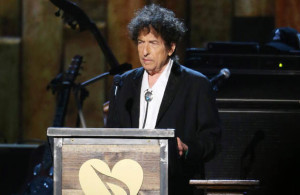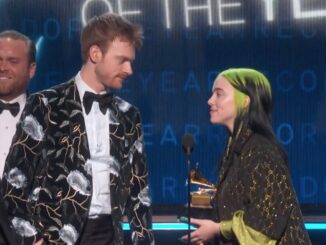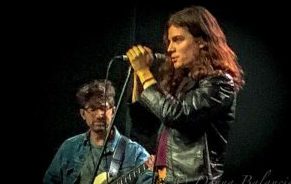
I’m glad for my songs to be honored like this. But you know, they didn’t get here by themselves. It’s been a long road and it’s taken a lot of doing.
These songs of mine, they’re like mystery stories, the kind that Shakespeare saw when he was growing up. I think you could trace what I do back that far. They were on the fringes then, and I think they’re on the fringes now. And they sound like they’ve been on the hard ground.
I should mention a few people along the way who brought this about. I know I should mention John Hammond, great talent scout for Columbia Records. He signed me to that label when I was nobody. It took a lot of faith to do that, and he took a lot of ridicule, but he was his own man and he was courageous. And for that, I’m eternally grateful. The last person he discovered before me was Aretha Franklin, and before that Count Basie, Billie Holiday and a whole lot of other artists. All noncommercial artists.
Trends did not interest John, and I was very noncommercial but he stayed with me. He believed in my talent and that’s all that mattered. I can’t thank him enough for that. Lou Levy runs Leeds Music, and they published my earliest songs, but I didn’t stay there too long.
Levy himself, he went back a long ways. He signed me to that company and recorded my songs and I sang them into a tape recorder. He told me outright, there was no precedent for what I was doing, that I was either before my time or behind it. And if I brought him a song like “Stardust,” he’d turn it down because it would be too late.
He told me that if I was before my time — and he didn’t really know that for sure — but if it was happening and if it was true, the public would usually take three to five years to catch up — so be prepared. And that did happen. The trouble was, when the public did catch up I was already three to five years beyond that, so it kind of complicated it. But he was encouraging, and he didn’t judge me, and I’ll always remember him for that.
Artie Mogull at Witmark Music signed me next to his company, and he told me to just keep writing songs no matter what, that I might be on to something. Well, he too stood behind me, and he could never wait to see what I’d give him next. I didn’t even think of myself as a songwriter before then. I’ll always be grateful for him also for that attitude.
I also have to mention some of the early artists who recorded my songs very, very early, without having to be asked. Just something they felt about them that was right for them. I’ve got to say thank you to Peter, Paul and Mary, who I knew all separately before they ever became a group. I didn’t even think of myself as writing songs for others to sing but it was starting to happen and it couldn’t have happened to, or with, a better group.
They took a song of mine that had been recorded before that was buried on one of my records and turned it into a hit song. Not the way I would have done it — they straightened it out. But since then hundreds of people have recorded it and I don’t think that would have happened if it wasn’t for them. They definitely started something for me.
The Byrds, the Turtles, Sonny & Cher — they made some of my songs Top 10 hits but I wasn’t a pop songwriter and I really didn’t want to be that, but it was good that it happened. Their versions of songs were like commercials, but I didn’t really mind that because 50 years later my songs were being used in the commercials. So that was good too. I was glad it happened, and I was glad they’d done it.
Purvis Staples and the Staple Singers — long before they were on Stax they were on Epic and they were one of my favorite groups of all time. I met them all in ’62 or ’63. They heard my songs live and Purvis wanted to record three or four of them and he did with the Staples Singers. They were the type of artists that I wanted recording my songs.
Nina Simone. I used to cross paths with her in New York City in the Village Gate nightclub. These were the artists I looked up to. She recorded some of my songs that she [inaudible] to me. She was an overwhelming artist, piano player and singer. Very strong woman, very outspoken. That she was recording my songs validated everything that I was about.
Oh, and can’t forget Jimi Hendrix. I actually saw Jimi Hendrix perform when he was in a band called Jimmy James and the Blue Flames — something like that. And Jimi didn’t even sing. He was just the guitar player. He took some small songs of mine that nobody paid any attention to and pumped them up into the outer limits of the stratosphere and turned them all into classics. I have to thank Jimi, too. I wish he was here.
Johnny Cash recorded some of my songs early on, too, up in about ’63, when he was all skin and bones. He traveled long, he traveled hard, but he was a hero of mine. I heard many of his songs growing up. I knew them better than I knew my own. “Big River,” “I Walk the Line.”
“How high’s the water, Mama?” I wrote “It’s Alright Ma (I’m Only Bleeding)” with that song reverberating inside my head. I still ask, “How high is the water, mama?” Johnny was an intense character. And he saw that people were putting me down playing electric music, and he posted letters to magazines scolding people, telling them to shut up and let him sing.
In Johnny Cash’s world — hardcore Southern drama — that kind of thing didn’t exist. Nobody told anybody what to sing or what not to sing. They just didn’t do that kind of thing. I’m always going to thank him for that. Johnny Cash was a giant of a man, the man in black. And I’ll always cherish the friendship we had until the day there is no more days.
Oh, and I’d be remiss if I didn’t mention Joan Baez. She was the queen of folk music then and now. She took a liking to my songs and brought me with her to play concerts, where she had crowds of thousands of people enthralled with her beauty and voice.
People would say, “What are you doing with that ragtag scrubby little waif?” And she’d tell everybody in no uncertain terms, “Now you better be quiet and listen to the songs.”
We even played a few of them together. Joan Baez is as tough-minded as they come. Love. And she’s a free, independent spirit. Nobody can tell her what to do if she doesn’t want to do it. I learned a lot of things from her. A woman with devastating honesty. And for her kind of love and devotion, I could never pay that back.
These songs didn’t come out of thin air. I didn’t just make them up out of whole cloth. Contrary to what Lou Levy said, there was a precedent. It all came out of traditional music: traditional folk music, traditional rock ‘n’ roll and traditional big-band swing orchestra music.
I learned lyrics and how to write them from listening to folk songs. And I played them, and I met other people that played them back when nobody was doing it. Sang nothing but these folk songs, and they gave me the code for everything that’s fair game, that everything belongs to everyone.
For three or four years all I listened to were folk standards. I went to sleep singing folk songs. I sang them everywhere, clubs, parties, bars, coffeehouses, fields, festivals. And I met other singers along the way who did the same thing and we just learned songs from each other. I could learn one song and sing it next in an hour if I’d heard it just once.
If you sang “John Henry” as many times as me — “John Henry was a steel-driving man / Died with a hammer in his hand / John Henry said a man ain’t nothin’ but a man / Before I let that steam drill drive me down / I’ll die with that hammer in my hand.”
If you had sung that song as many times as I did, you’d have written “How many roads must a man walk down?” too.
Big Bill Broonzy had a song called “Key to the Highway.” “I’ve got a key to the highway / I’m booked and I’m bound to go / Gonna leave here runnin’ because walking is most too slow.” I sang that a lot. If you sing that a lot, you just might write,
Georgia Sam he had a bloody nose Welfare Department they wouldn’t give him no clothes He asked poor Howard where can I go Howard said there’s only one place I know Sam said tell me quick man I got to run Howard just pointed with his gun And said that way down on Highway 61
You’d have written that too if you’d sang “Key to the Highway” as much as me.
“Ain’t no use sit ‘n cry / You’ll be an angel by and by / Sail away, ladies, sail away.” “I’m sailing away my own true love.” “Boots of Spanish Leather” — Sheryl Crow just sung that.
“Roll the cotton down, aw, yeah, roll the cotton down / Ten dollars a day is a white man’s pay / A dollar a day is the black man’s pay / Roll the cotton down.” If you sang that song as many times as me, you’d be writing “I ain’t gonna work on Maggie’s farm no more,” too.
I sang a lot of “come all you” songs. There’s plenty of them. There’s way too many to be counted. “Come along boys and listen to my tale / Tell you of my trouble on the old Chisholm Trail.” Or, “Come all ye good people, listen while I tell / the fate of Floyd Collins a lad we all know well / The fate of Floyd Collins, a lad we all know well.”
“Come all ye fair and tender ladies / Take warning how you court your men / They’re like a star on a summer morning / They first appear and then they’re gone again.” “If you’ll gather ’round, people / A story I will tell / ‘Bout Pretty Boy Floyd, an outlaw / Oklahoma knew him well.”
If you sung all these “come all ye” songs all the time, you’d be writing, “Come gather ’round people where ever you roam, admit that the waters around you have grown / Accept that soon you’ll be drenched to the bone / If your time to you is worth saving / And you better start swimming or you’ll sink like a stone / The times they are a-changing.”
You’d have written them too. There’s nothing secret about it. You just do it subliminally and unconsciously, because that’s all enough, and that’s all I sang. That was all that was dear to me. They were the only kinds of songs that made sense.



